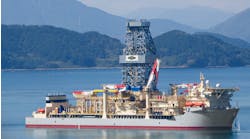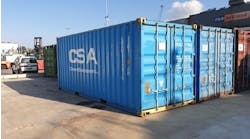Counter-rotating propeller system improves fuel use and crew comfort
Anew propulsion system from Volvo Pentaoffers small offshore vessels higher speed, enhanced maneuverability and lower fuel consumption, the company says. IPS (Inboard Performance System) offers improved performance compared with a traditional inboard shaft propulsion system, the company claims.
IPS is a totally new design developed originally for the pleasure boat sector. Following a successful launch last year, Volve Penta is developing the system for commercial applications, including crew and rescue boats.
As a first step, the company is seeking type approval under DNV’s high-speed code. It has already received orders for both coast guard vessels and ferries fitted with IPS propulsion, according to Gerard Törneman, manager for product and product planning in the marine commercial division.
The system uses two steerable propulsion units with forward-facing counter-rotating propellers. Because the propellers are fixed at the front of the mounting, they work in undisturbed water, the result being that all the force generated is translated into horizontal thrust. The units are placed beneath the boat so that the backwash goes parallel with the hull, and all the power is directed into driving the boat forwards.
In comparisons between identical boats fitted with the IPS system and a conventional inboard propeller shaft, the IPS boat delivered significantly better performance - 20% higher top speed, 15% faster acceleration and 30% reduced fuel consumption.
The steerable drive units also provide a high level of maneuverability, making it easy to dock, or in an offshore context, draw up alongside a rig or platform. The shift, throttle and steering controls, which use Volvo Penta’s Electronic Vessel Control system, give immediate response to driver commands.
The two drive systems are completely separate, giving the system full redundancy. Even with only one engine performance is good, and 70% of maneuvering capability is maintained.
For crew and passengers the experience of riding in an IPS boat brings major improvements in onboard comfort. Noise levels are low and combined rubber suspension and sealing rings absorb propulsion forces and vibrations. Emissions from the state-of-the-art engines are minimized and the exhaust fumes are emitted through the propulsion unit into the prop wash and carried well behind the boat.•
For more information contact Gerard Törneman, Volvo Penta. Tel +46 31 322 5090, fax +46 31 779 7526, [email protected], www.volvopenta.com




